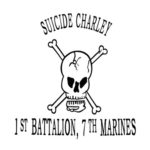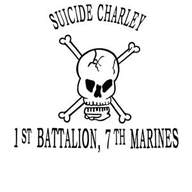Marine Lance Cpl. Aaron W. Simons was taking a break while patrolling the desert city of Qaim in western Iraq, near the Syrian border, when he was killed last month.
His team had reached what the military calls a “hardened site” — a structure surrounded by sandbags and concertina wire, said his cousin John Widick. The Marines longed to shed their flak jackets, drink water and find refuge from the pale yellow desert, dry heat and coarse sand, he said.
For Simons, 20, the stop also meant a chance to lay down his heavy machine gun. Although he had been a skinny teenager in his hometown of Modesto, he had bulked up so much since joining the Marine Corps that he had been named SAW gunner — typically a burly Marine whose job it is to carry the squad’s heaviest hand-held weapon, the 15-pound Squad Automatic Weapon machine gun.
Simons had just taken off his armor and Kevlar gloves. Then came the attack.
A rocket-propelled grenade hit his compound. Simons’ wounds were severe and he bled to death April 24 before reaching a medical facility, Widick said.
The Department of Defense issued a news release two days later stating that Simons was killed “while conducting combat operations against enemy forces in Al Anbar province.”
Simons was assigned to the Marine Corps’ so-called suicide Charlie unit — the 1st Battalion, 7th Marine Regiment, 1st Marine Division, 1st Marine Expeditionary Force in Twentynine Palms, Calif. He was on his second tour in Iraq.
A dark-haired man with thick eyebrows, Simons was “a dichotomy,” said his sister Rachel. He combined a nonconformist, artistic sensibility with a love for military life, she said.
Simons had readily traded the ponytail and goatee he wore in high school for a Marine haircut and the sort of tattoos that troops give each other while passing time in war zones. But he remained the poet of his family — a sensitive young man who played guitar, loved to draw and designed his own avant-garde T-shirts — “a wearable work of art,” his sister said of one.
He was the youngest of four children born to an electrical engineer and a homemaker in what was, when he was a child, still a farming community. The family still lives in the same house where Simons was born.
“When he was growing up, he was very shy, very quiet, very artistic,” his cousin said.
Simons’ father bought him a guitar in a secondhand store. He trailed along with a friend taking music lessons and listened in. Simons became an accomplished player, strumming guitar for worshippers in his church and forming his own garage band, Widick said.
Simons played blues, rock ‘n’ roll, rockabilly, gospel and classical, his cousin said. An antique violin had been passed down in the family, and Simons taught himself to play that too.
Simons had difficulties in school and left Davis High in Modesto for an alternative campus. His long hair didn’t go over well in the conservative town and made getting a job harder, his sister said.
He didn’t go to college and dreaded the prospect of toiling at minimum-wage fast-food jobs. So he joined the Marines, placing high on his tests and choosing the infantry, Widick said.
In Twentynine Palms, he filled out, becoming a big man — “a gentle giant,” Widick said.
Simons was good-looking, with olive skin and full lips — traces of Assyrian ancestry on his mother’s side, his cousin said. He met a young woman at a Marine gala. The family thought they might marry.
Simons was a friend to many. He piled up bills lending his cellphone to fellow troops and racked up miles on his Mazda driving friends from the base to Northern California nearly every weekend.
“People used his car like a taxi when he was on base. He used to have to search for it in the evening,” Widick said.
His parents sent two guitars to Iraq so that he could teach friends to play, his cousin added.
The last-chance glimpse Widick had of the young Marine was typical: Widick was driving through Joshua Tree, Calif., and spotted Simons at the top of a lookout point, surrounded by fellow Marines from Twentynine Palms, out on a lark.
Simons had talked of wanting to be a paramedic when his service ended. Or perhaps, he said, he would move to Los Angeles to pursue music. Still a kid from Modesto at heart, Southern California was “bright and new and exotic” to him, his cousin said.
After his death, military representatives knocked on the Simons family’s door in Modesto late at night. One of his sisters was awake, studying for her nursing classes in the living room. She let them in to hear the news. The area where Simons died, around the city of Qaim, has seen especially fierce fighting in recent weeks.
He had been cautious in talking about his service in Iraq, though he told his family that he disagreed with some of the decisions he saw being made there. But he was deeply committed to the Marines, and to Iraqis, Widick said. He had recently adopted an Iraqi family with an ill daughter, giving them support and helping them get medical aid, his cousin said.
Simons “wanted to do the best job he could,” Widick said. “He thought it was already too late. We were already in Iraq, and we needed to do our best.”
In addition to his sister Rachel, Simons is survived by his parents, John and Charlotte Simons; a brother, Michael; and another sister, Michelle, all of Modesto.
Source: https://www.latimes.com/archives/la-xpm-2006-may-21-me-simons21-story.html


